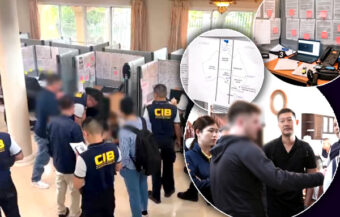Thailand’s tourism industry faces a 40% decline in revenues this year compared to 2019, prompting a reevaluation. A disappointing response from Chinese tourists and a lack of Western enthusiasm have necessitated a focus on domestic travel and second-tier cities.
With foreign tourism visitor and income projections for 2023 being revised downwards and projected to be nearly 40% off 2019 revenue figures with fewer visitors, off by 30% and lower spenders because of an absence of Western tourists, Thailand’s newly appointed tourism agency chief is signalling a move towards more domestic tourism as she plots a course to 2027 when she hopes 40% of the country’s tourism income will be generated at home while the tourist sector itself will grow to a whopping 27% of GDP.

Facing a 40% decline overall in revenues from 2019, rejection from Chinese tourists and lack of former enthusiasm from Western travellers, Thailand’s tourism industry seeks a new direction.
With a projected income of ฿1.2 trillion this year, 39.39% less than 2019, the Tourism Authority of Thailand (TAT) now eyes 28 million arrivals this year but many Bangkok-based analysts suggest this would be a positive outcome for the year given the pronounced decline in trends.
Downturn since September sees many economic analysts now forecasting 27.5 million arrivals by the end of December with revenue generated at ฿1.2 trillion
Since September, a pronounced downturn in foreign tourism has left Thailand’s economic planners and tourism executives concerned.
Independent analysts predict 27.5 million arrivals in 2023, emphasising shorter-halt tourists from Asia. The anticipated income of ฿1.2 trillion falls significantly below the 2019 record of ฿1.98 trillion.
Thailand’s cautious approach to reopening after the COVID-19 lockdown when it prioritised public health over the economy, leading to a delayed full reopening only earlier this year, is a key reason for the downturn as it damaged confidence within segments of the worldwide travel industry and saw a loss of goodwill that existed towards the country.
Other factors include the rising cost of living in Western markets and a significant and under-reported downturn in the Chinese economy as well as a more cautious approach by international airlines seeking higher load factors.
Tourism boss blames economic problems in key markets for the disappointing outcome this year and refocuses on domestic tourism and second-tier cities
TAT’s governor, Thapanee Kiatpaiboon, last week, set a renewed target of 28 million visitors with ฿1.2 trillion in income for 2023.
She attributed the disappointing results to global economic challenges and the underperformance of the Chinese market, which was heavily relied upon. Ms Thapanee highlighted the need to boost domestic tourism and focus on second-tier cities in Thailand for local tourists.
These cities are generally outside the foreign tourist hotspots where foreign tourists tend to congregate such as Bangkok, Pattaya, Phuket, Chiang Mai, Hua Hin and Ko Samui.
‘Foreign tourism will become 27% of Thailand’s GDP by 2027, and the country must move to become less dependent on foreign tourism from now on,’ emphasised Ms Thapanee, hinting at a shift in the nation’s tourism strategy.
China’s policy of facilitating its own domestic tourism market has cost Thailand its hoped-for shot in the arm from the troubled Communist country
Global economic issues, unresolved flight problems, and disappointment in the Chinese market have contributed to this downturn. The Chinese economy’s troubles and a focus on promoting domestic tourism by the Chinese government have impacted the anticipated 4-4.04 million Chinese arrivals, with only 3.4-3.5 million now expected.
The reduced cost of domestic air tickets in China further indicates a preference for domestic travel.
On the contrary, Thai people’s travel within the country has exceeded the set target for the year. With 228 million trips recorded from January to November, the year-end total is expected to reach 240 million, generating ฿800 billion in income. The government’s stimulus has encouraged more frequent travel among Thai citizens.
The combined income from foreign tourists and Thais in 2023 is projected to be ฿2 trillion, falling short of the ฿2.4 trillion revenue target.
Less Western and European visitors means lower per capita income and overall revenue within the foreign tourism sector, explaining things so far in 2023
The reduced per capita income and loss of higher spenders, especially among Europeans with longer stays, contributed to a reduced overall income per visitor in 2023.
This was caused by more tourists from neighbouring countries with shorter stays visiting Thailand, explained the Tourism Authority of Thailand (TAT) boss.
To stimulate tourism, the Thai government has implemented visa exemption measures and extended the stay period for Russian tourists.
The Tourism Authority of Thailand (TAT) is considering policies for tourists from neighbouring countries to stay longer, increasing spending in Thailand. There are plans to renew visa exemption measures for Chinese tourists and discussion of multiple entry visas with the Ministry of Foreign Affairs.
Proposal floated for 90 day tourist visas for some European visitors to Thailand has not emerged since November as Russian tourists enjoy such a benefit
Strangely, there has been no further mention of a proposal put forward in November by Prommin Lertsuridejm, the Secretary-general to the Prime Minister, for a longer 90-day visa to be granted to tourists from some European countries to boost not only European arrivals but subsequently, foreign tourism income levels.
Such a visa is already on offer to Russian visitors, many of them escaping the war and the extremely cold temperatures at home at this time of the year.
90-day visa for European travellers to boost confidence and goodwill damaged by pandemic
Ms Thapanee acknowledged the challenges and emphasised Prime Minister Srettha Thavisin’s understanding of tourism issues in her recent statement.
The government has taken steps to manage Thai tourism’s online image, stimulate tourism in secondary cities, and provide quick wins in respect of the foreign tourist market.
Domestic tourism figures and activities in secondary cities and locations offer some hope for the new Tourism Authority of Thailand (TAT) chief
In some rare good news from the tourism front, Ms Thapanee revealed that Thailand’s tourism revenue in second-tier cities is expected to exceed 2019 levels by nearly 40%, contributing to total domestic travel revenue surpassing the ฿800 billion forecast by TAT.
Thapanee Kiatphaibool, the newly appointed Tourism Authority of Thailand (TAT) governor, noted that Thai tourists have shown increased interest in exploring new places since the pandemic, leading to higher domestic spending per trip.
Revenue from second-tier cities during the first nine months of 2023 saw a 39% increase compared to 2019, reaching ฿170 billion.
The expected 40% growth by year-end contributes to the overall domestic revenue target of ฿800 billion.
The TAT’s definition of second-tier cities, drawing around 4 million visitors per year, may be revised to fit the current situation. The agency will continue to promote 55 cities through year-round campaigns to support tourism.
TAT tourism agency plans to select top secondary cities to be upgraded to major tourist centres through marketing budgets and laying on increased flights
Looking ahead to 2024, the Tourism Authority of Thailand (TAT) forecasts a 10-15% revenue growth in second-tier cities, driven by marketing promotions and increased flights.
Collaborating with the Thai Chamber of Commerce, the TAT plans to select 10 potential secondary cities for investment in trade, tourism, and upgrades to major tourism centres.
The private sector will receive support for upskilling and reskilling programmes, aiming to contribute 25% of GDP by 2027.
These initiatives not only diversify the market but also reduce reliance on foreign tourists, with the TAT aiming to increase the portion of domestic tourism revenue to 40%, up from the 33% seen in 2019.
Recently appointed TAT boss faces an uphill challenge and a particularly difficult job with both political and economic drivers needing to be balanced
Amidst a turbulent period for the kingdom’s tourism industry, Ms Thapanee, the new 49-year-old Governor of the Tourism Authority of Thailand (TAT), faces a daunting task. She assumed office on September 1, 2023, succeeding Yuthasak Supasorn, bringing a wealth of experience to her new role.
Having joined TAT in 1999, Thapanee’s journey within the organisation commenced as an International Relations Officer.
After graduating from Bangkok University and gaining a Master’s Degree from the University of Surrey in the United Kingdom, she steadily ascended the ranks, fulfilling roles such as Director of Tourism Product Production and Deputy Governor for Domestic Market.
Born on December 1, 1974, Thapanee, is affectionately known as ‘Klang.’
She hails from a family with ties to public service, her father being the former Permanent Secretary of the Ministry of Commerce. However, her tenure as governor coincides with a challenging period for Thailand’s vital tourism industry.
Controversial proposal for Chinese police patrols in November showcased the acute difficulties involved in the job of Tourism agency boss in Thailand
The scrutiny intensified for Thapanee, just months into the role in the middle of November when negotiations with the Chinese Embassy, particularly concerning a Chinese police patrol project aimed at bolstering confidence for Chinese visitors, was quickly scotch by Minister of Tourism and Sports Sudawan Wang-Suphakitkosol due to adverse political reaction.
Chinese police patrols plan dumped by ministers quickly after public backlash threatened to erupt
Police Chief rebuffs reports of Chinese Police being deployed to Thailand to protect tourists
Those efforts, while sparking criticism, underscore the formidable challenges confronting the new Tourism Authority of Thailand (TAT) Governor in steering Thailand’s tourism sector through troubled waters.
Join the Thai News forum, follow Thai Examiner on Facebook here
Receive all our stories as they come out on Telegram here
Follow Thai Examiner here
Further reading:
Chinese police patrols plan dumped by ministers quickly after public backlash threatened to erupt
Police Chief rebuffs reports of Chinese Police being deployed to Thailand to protect tourists
Police chief confirms 2 dead with reports of at least one more fatality in Bangkok mass shooting
14-year-old boy murdered Chinese tourist in a terror attack on Bangkok’s Siam Paragon Centre
Police arrest Chinese kidnapper with similar details to an abduction for ransom case in April
New visa-free regime plan for Chinese tourists will see more criminal elements entering Thailand
Crackdown on crime wave against Chinese tourists in Bangkok as concerns also raised on cannabis


















